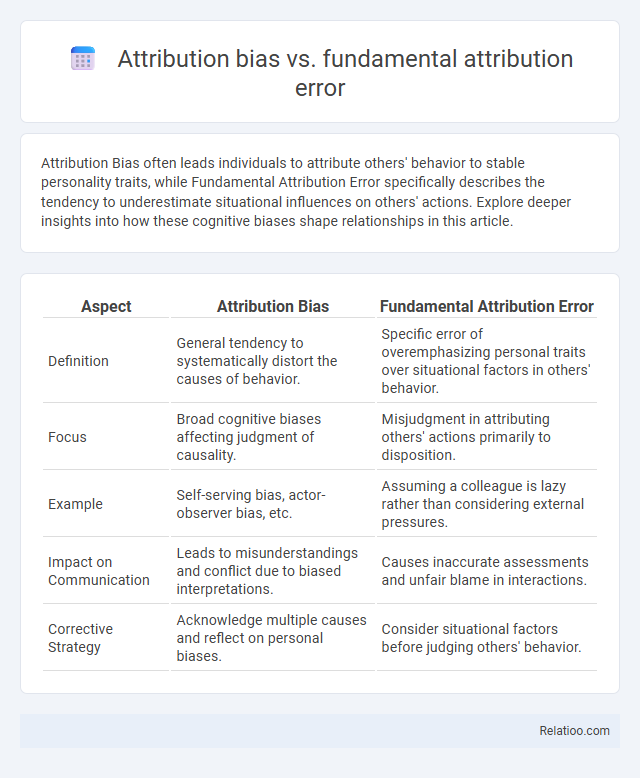Attribution Bias often leads individuals to attribute others' behavior to stable personality traits, while Fundamental Attribution Error specifically describes the tendency to underestimate situational influences on others' actions. Explore deeper insights into how these cognitive biases shape relationships in this article.
Table of Comparison
| Aspect | Attribution Bias | Fundamental Attribution Error |
|---|---|---|
| Definition | General tendency to systematically distort the causes of behavior. | Specific error of overemphasizing personal traits over situational factors in others' behavior. |
| Focus | Broad cognitive biases affecting judgment of causality. | Misjudgment in attributing others' actions primarily to disposition. |
| Example | Self-serving bias, actor-observer bias, etc. | Assuming a colleague is lazy rather than considering external pressures. |
| Impact on Communication | Leads to misunderstandings and conflict due to biased interpretations. | Causes inaccurate assessments and unfair blame in interactions. |
| Corrective Strategy | Acknowledge multiple causes and reflect on personal biases. | Consider situational factors before judging others' behavior. |
Introduction to Attribution Bias and Fundamental Attribution Error
Attribution bias refers to the tendency to systematically distort the causes of behavior, often favoring internal explanations for others' actions while overlooking situational factors. Fundamental Attribution Error, a specific type of attribution bias, involves attributing others' behaviors primarily to their character rather than external circumstances. Understanding these concepts helps you recognize how cognitive biases influence social perception and decision-making.
Defining Attribution Bias
Attribution bias refers to the systematic errors people make when inferring the causes of behavior, often favoring explanations aligned with their own perspectives or desires. It differs from the Fundamental Attribution Error, which specifically involves overemphasizing dispositional factors while underestimating situational influences when evaluating others' actions. Understanding attribution bias is crucial for recognizing how cognitive distortions shape social judgments and decision-making processes.
What is Fundamental Attribution Error?
Fundamental Attribution Error refers to the tendency to overemphasize personal characteristics and ignore situational factors when explaining others' behavior. Unlike general attribution bias, which includes various distortions in interpreting causes of behavior, this error specifically misattributes actions to inherent traits rather than external circumstances. Understanding this cognitive bias helps you recognize that people's behavior is often influenced more by context than by their personality.
Key Differences Between Attribution Bias and Fundamental Attribution Error
Attribution bias generally refers to a broad range of cognitive biases affecting how people explain behaviors, while Fundamental Attribution Error (FAE) specifically describes the tendency to overemphasize dispositional factors and underestimate situational influences when evaluating others' actions. The key difference lies in scope; attribution bias encompasses various biases including self-serving bias and actor-observer bias, whereas FAE is narrowly focused on misattributing causes of behavior in others. Understanding this distinction is crucial for accurately analyzing human judgment and social perception.
Psychological Theories Behind Attribution Biases
Attribution Biases encompass a range of psychological tendencies where individuals interpret others' behavior through a distorted lens, often influenced by internal or external factors. Fundamental Attribution Error specifically refers to the tendency to overemphasize personal traits while underestimating situational influences when judging others' actions. Understanding these biases is crucial for improving Your interpersonal judgments by recognizing how cognitive processes and social perceptions shape inaccurate attributions in psychological theory.
Real-Life Examples of Attribution Bias
Attribution bias occurs when individuals systematically misjudge the causes of events, often attributing behavior to personality rather than situational factors. For example, a manager may assume an employee's tardiness reflects laziness (dispositional attribution) rather than external factors like traffic (situational attribution), illustrating fundamental attribution error. This cognitive bias influences decision-making and interpersonal relationships by skewing perceptions toward internal causes over external circumstances.
Real-Life Examples of Fundamental Attribution Error
Fundamental Attribution Error occurs when people attribute others' negative behaviors to their character rather than situational factors, such as blaming a colleague's tardiness on laziness instead of external traffic delays. Attribution Bias broadly includes errors in assigning causes to behavior, like the self-serving bias where individuals credit successes to themselves but blame failures on external factors. Real-life examples of Fundamental Attribution Error appear in workplace misunderstandings, where managers may view underperformance as lack of effort rather than considering personal issues or resource constraints impacting the employee.
Why Do These Attribution Errors Occur?
Attribution bias, fundamental attribution error, and other attribution errors occur due to cognitive shortcuts that simplify complex social information processing. These biases arise because the human brain tends to favor internal explanations for others' behavior while underestimating situational factors, leading to systematic errors in judgment. Such errors are driven by limited information, motivational influences, and the need to maintain a coherent and stable interpretation of social interactions.
Impact of Attribution Biases in Everyday Life
Attribution bias leads you to misinterpret the causes of behavior, often influencing personal and professional relationships by skewing perceptions of others' intentions. Fundamental attribution error intensifies this effect by disproportionately blaming others' actions on their character rather than situational factors, potentially causing misunderstandings and conflict. These biases contribute to distorted judgments and impaired decision-making, affecting your interactions and the fairness of social evaluations.
Strategies to Minimize Attribution Bias and Fundamental Attribution Error
Attribution bias and fundamental attribution error often lead to inaccurate judgments about others' behavior by overemphasizing personality traits while underestimating situational factors. To minimize these biases, you should actively consider external circumstances influencing behavior and seek multiple perspectives before drawing conclusions. Practicing empathy and reflecting on your own possible biases enhances fairness and accuracy in social perception.

Infographic: Attribution Bias vs Fundamental Attribution Error
 relatioo.com
relatioo.com